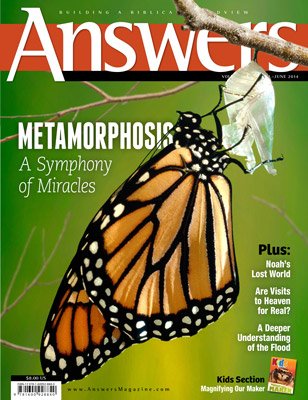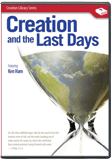Every Bush a Burning Bush
Biblical Authority
When Moses turned aside to see the burning bush, he was stepping onto holy ground. Yet the Bible teaches us that all ground is holy ground.
The first thing God tells us in the Bible, the foundation of all our knowledge about Him, is that He made everything. There are a lot of things He could have told us first, but that’s what He chose. It’s really important. It’s where we have to start.
We can learn a lot about an artist by studying his work, especially when we start with what he himself has said about it. Those who study the paintings of Picasso, for example, will notice the distortions in his female figures and suspect that his relationships with women were troubled. And they would be right. Similarly—and much more positively—we can learn a lot about God by studying His artwork, His creation. Theologians call that general revelation.
When we study the cosmos, we’re learning about God—His greatness, His goodness, His wisdom, His aesthetic. In school we call that science, but it’s really theology.
You might be surprised to realize that all objects of human study work that way. A lot of people think math, for example, is secular—that 2 + 2 = 4 whether you believe in God or not. While that might be true, it’s also simplistic. Math is the study of the quantities and relationships we see in nature. I like to say it’s the design language God chose when He created the universe.1 So math, too, is theology; it’s one of our most intimate looks at how God’s mind works.
What about the other subjects we study? God has done other works besides creation, and the primary one is providence. He oversees the affairs of people and nations (Psalm 75:7). In school we call that history, and the story—the true story—God is telling in history tells us a lot about the Storyteller.
What else? Well, God identifies the peak of His creation as man (Genesis 1:26). Human beings are qualitatively different from other creatures: we bear God’s image. Theologians have written a lot about what that means precisely, but at minimum it means we can learn a lot about God by studying mankind. In school we call that the humanities. English composition and literature teach us how fallen man in the image of God thinks. The arts—music, speech, and art—tell us a lot about how man in the image of God creates, or should create if not tainted by sin. It’s all theology; it’s all about Him.
So whatever you study is important to the extent that it teaches you about God and helps you have a closer relationship with Him. Any line of work you’re in—if it’s legal and moral—is an avenue of service for God. While church is central and a necessary means of grace, your relationship with God is about much more than “going to church.” As God’s Word infuses your heart and perspective on all things, every day, every action, every thought, every plan, every “accident” becomes part of your growing relationship with Him.
In 1880, the Dutch theologian Abraham Kuyper argued exactly this point. He famously stated, “There is not one square inch in the whole domain of our human existence over which Christ, who is sovereign over all, does not cry, ‘Mine!’”2
Elizabeth Barrett Browning put it this way:
Earth’s crammed with heaven,
And every common bush afire with God;
And only he who sees takes off his shoes;
The rest just sit round it and pluck blackberries,
And daub their natural faces unaware.3
Bob Jones, Sr., the founder of the university where I teach, put it similarly: “For the Christian, there is no difference between the secular and the sacred. Every bush is a burning bush; all ground is holy ground.” We know from Scripture that the cosmos is not the same as when God created it. It has been marred by sin, and there are many things in it—most obviously death—that were not part of God’s original design.
We will go astray if we do not base all our interpretations of God’s general revelation on His Word, which is superior to all other revelation. Because sin brought changes into creation, we must use the Scripture’s teaching to correct the way we understand how God intended different parts of the cosmos to teach about Him.
But that doesn’t change our purpose or goal. All that we learn, all that we decide, all that we do is to be with the goal of learning Him, knowing Him, loving Him, serving Him. There is no greater—there is no other—goal.
Discussion Questions . . .
- Psalm 19:1 says that “the heavens declare the glory of God.” What are some of God’s attributes, or characteristics, that you can learn by studying creation?
- If we can learn about God by just looking around, how would you answer the common question, “Would God send to hell someone who has never heard about Jesus?” See Romans 1:20 for some ideas.
- Give some examples of mathematical principles that reflect our observation of God’s creation. Hint: It might be easier to start with geometry.
- What can we learn about God by studying the “story” of history (the facts as they are woven together into larger themes)? What does the way He guides the story tell us about Him? Hint: The Bible has a lot to say about the shortness and uncertainty of life, and the sudden destruction of the proud.
- Can an unregenerate artist create beauty? Why or why not?
- Identify your specific primary interest in life: major in school, career, or similar indicator. How can that be a vehicle for learning about God?
- Based on the principles presented here, how should you change the way you think and act?
Related Downloads
Every Bush a Burning Bush: Discussion Questions
PDF DownloadAnswers Magazine
April – June 2014
A closer look at the Genesis Flood account reveals a beautifully written, unified narrative that points to one inspired author. The passage masterfully highlights one central message: “God remembered Noah.” Along with in-depth articles on the Flood, this issue shows biblical and historical evidences of Christ’s Resurrection, new discoveries about the miracle of a butterfly’s metamorphosis and much more!
Browse Issue SubscribeFootnotes
- Galileo agreed. He wrote, “Philosophy is written in this grand book the universe. But the book cannot be understood unless one first learns to comprehend the language and read the characters in which it is composed. It is written in the language of mathematics” (The Assayer, 1623).
- James D. Bratt, ed., Abraham Kuyper: A Centennial Reader (Grand Rapids, Michigan: Eerdmans, 1998), p. 461
- Book vii, “Aurora Leigh.”
Recommended Resources

Answers in Genesis is an apologetics ministry, dedicated to helping Christians defend their faith and proclaim the good news of Jesus Christ.
- Customer Service 800.778.3390
- © 2024 Answers in Genesis







